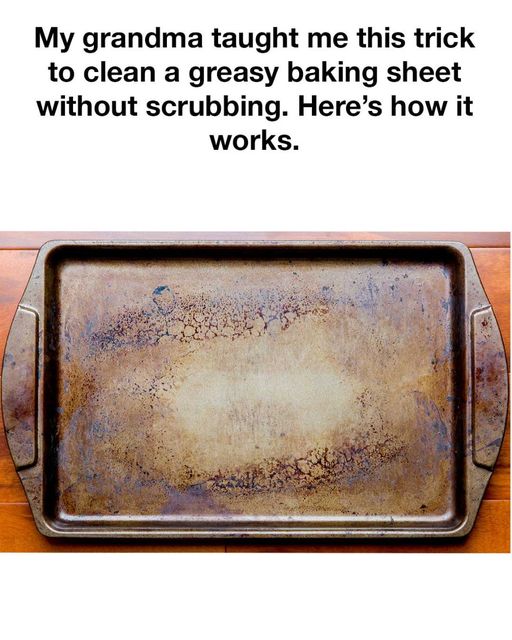Start by sprinkling a generous amount of baking soda over the greasy areas of the baking sheet. Make sure to cover all the stubborn spots where the grease is most prominent. You don’t need to worry about measuring; just ensure there’s enough to coat the greasy patches.
Step 2: Add a Splash of Vinegar
Next, pour a small amount of vinegar over the baking soda. You’ll notice an immediate reaction as the baking soda starts to fizz and bubble. This reaction helps to break down the grease, loosening it from the surface of the baking sheet.
Step 3: Let it Sit
Once you’ve applied the baking soda and vinegar, let the mixture sit for about 15 to 30 minutes. This waiting period allows the natural ingredients to work their magic, breaking down the grime so it can be easily wiped away.
Step 4: Wipe Away the Grime
After the mixture has had time to sit, take a damp sponge or cloth and wipe away the grease and residue. You’ll find that the grime comes off easily, without the need for vigorous scrubbing. For particularly stubborn spots, you can use a soft-bristle brush to gently loosen the residue.
Step 5: Rinse and Dry

Finally, rinse the baking sheet with warm water to remove any remaining baking soda and vinegar. Dry it with a clean towel, and your baking sheet will look as good as new!
Why This Method Works
The key to this method is the combination of baking soda and vinegar. Baking soda’s abrasive properties gently scrub away the surface grime, while vinegar’s acidic nature breaks down the grease. The fizzing reaction helps to lift even the most stubborn stains, allowing you to clean your baking sheet without damaging it or spending hours scrubbing.
This method is particularly effective because it’s gentle on your cookware. Unlike harsh chemical cleaners, which can leave behind toxic residues or damage the non-stick surface, baking soda and vinegar are safe and non-toxic. They’re also cost-effective, making this an affordable cleaning solution that you can use repeatedly without worrying about harmful effects.
Additional Tips and Tricks
For Extra Stubborn Stains: If the grease is particularly stubborn, you can make a paste by mixing baking soda with a small amount of water before applying the vinegar. This thicker mixture can adhere better to vertical surfaces or tough spots.
Use Aluminum Foil for Scrubbing: For any spots that require a bit more abrasion, you can use a small piece of crumpled aluminum foil to gently scrub the area. It’s effective and still less harsh than using a steel wool pad.
Avoid Letting Grease Build Up: To prevent grease from building up in the first place, try to clean your baking sheets as soon as they cool down after use. The longer the grease sits, the harder it becomes to remove.
Baking Soda and Vinegar for Other Uses: This cleaning combination isn’t just for baking sheets. You can use it to clean your oven, stovetop, or even unclog drains. It’s a versatile solution that belongs in every kitchen.

Cleaning a greasy baking sheet doesn’t have to be a daunting task. Thanks to my grandma’s tried-and-true method, you can save time and effort while keeping your cookware in pristine condition.
The combination of baking soda and vinegar is a natural, effective way to tackle tough grease without the need for harsh scrubbing or harmful chemicals. So the next time you’re faced with a greasy mess, remember this simple trick and enjoy the ease of cleaning your baking sheets the way my grandma did—effortlessly and naturally.

